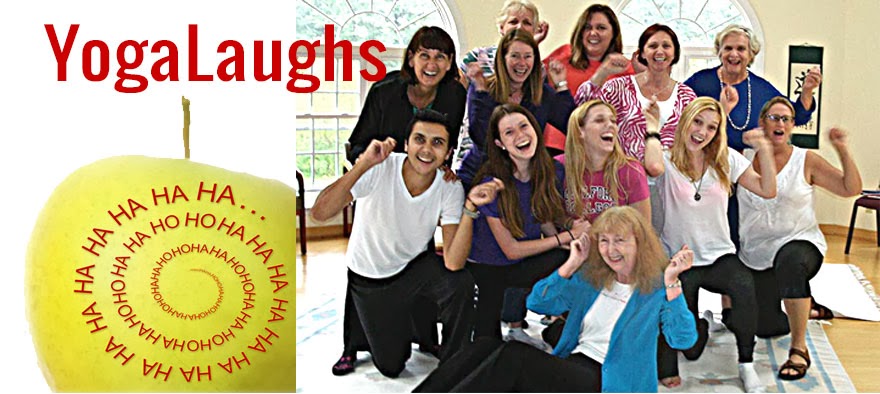If you'd ever had a taste of major depression, you know it's far more than having the blues. Depending on the severity, it can feel like anything from walking through molasses to, "...the sinking feeling that your connection to God is broken and you are left to float on your own in a roaring, liquid black space, like an astronaut who has been cut loose from his spaceship and all that linked him to earth..." (from Darkness Visible, by Pulitzer Prize Winner, William Styron) Severe depression permeates daily life on every level and in every way. The amount of emotional pain one feels is often beyond what another can fathom unless they've been through something similar.
These are the ways and the whys of how the regular, prolonged laughter in Laughter Yoga helped me out of severe major depression. These are not cures - and I'm not a doctor. These are just personal observations.
1.
My mood lifted immediately, which lasted for a few hours, and I was able to let go of the bitterness and cynicism that often accompany depression. Why? Laughter Yoga balances neurochemicals and hormones. Endorphins, dopamine, serotonin, melatonin and oxytocin are boosted and every stress hormone is lowered when we laugh heartily for more than 15 minutes. It's also hard to laugh and think at the same time. Ha!
2.
Social anxiety loosened. It's an ancient form of communication - laughter. Many researchers say it preceded language in the form of panting as a way to communicate play, affection and safety. So, no long conversations were needed from whomever was participating to feel a strong, open-hearted, unspoken bond with each other after a Laughter Yoga session. One of the common symptoms of major depression is withdrawal from social events, fun and relationships. Laughter Yoga sessions gave me a way to connect with others without much effort - and to be in physical contact with them through laughter games like "The High Five". It's just a fun hand slap, but made a difference in feeling like I was still connecting with others.
3.
I was leading a group of committed laughers, and was doing something I was good at doing. Leading and being good at leading Laughter Yoga convinced me that depression had not taken everything from my life. Plus, others who were struggling with their own challenges were relying on me to show up, every week, and laugh with them. Laughter Yoga was really helping them, too. This is where my phrase,
The more you laugh, the more you laugh, comes from. I laughed for an hour a week, at least, and found myself laughing much more in every day situations and finding funny things much funnier, despite myself.
4.
My physical health improved. Science shows almost all disease either starts with a depletion of oxygen in the body and/or chronic stress. A lack of oxygen causes cells to mutate, then mutated cells multiply and form tumors... Ongoing stress ages our bodies and lowers our immunity. Laughter Yoga is strong medicine for all of these. Because strong diaphragmatic pumping of the lungs is required to laugh heartily, our bodies become flooded with fresh oxygen. One minute of hearty laughter exchanges as much oxygen in our lungs as 10 minutes on a rowing machine. It's also hard to breathe deeply and stay stressed out. Why? Deep breathing triggers the Vagus nerve, which stimulates the parasympathetic nervous system. It's the sympathetic nervous system that's on overload with stress. The parasympathetic nervous system is there to bring peace and calm us down. Immunity is also boosted by over 20% - the whole system - after 15 minutes of laughter. This can last for up to 20 hours.
5.
These benefits and changes were subtle. After about a year of leading laughter yoga, I encountered similar situations and challenges I had encountered during the prior year. My reaction to the same situation was very different. My once bleak perspective had sneakily leveled out and lightened on me. This took me by surprise. If I had seen major changes too quickly with Laughter Yoga, my self-destructive, sad perceptions would have rebelled. Remember when majorly depressed, one's thinking is distorted. It would have been too good, too fast. I wouldn't have been able to tolerate sudden, "happy" changes.

These are just five ways Laughter Yoga helped me. After seven years of leading, there are a myriad more. I don't struggle with major depression now. I am so grateful. It wasn't easy to recover and took years. Help came from Laughter Yoga, but also from many skilled, caring people and faithful friends. Laughter Yoga seems like the small light that gently pierced the dark void, then everything else seemed easier, worked better and felt better. It was a good place to start, just as a form of exercise, in relieving my depression. You
don't have to be in a good mood, feel like laughing, or be in a "good place" to start this practice.
Trust me!
I hope to laugh with you soon.











